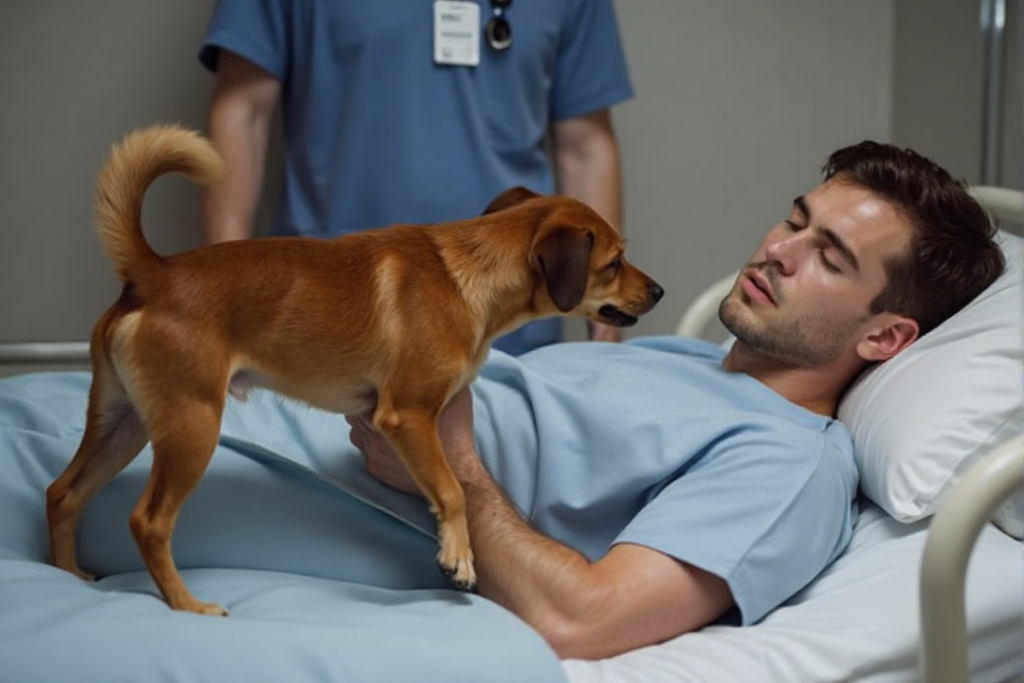The ICU was unnaturally still that morning, the low hum of machines the only sound in the dim, sterile room. Officer Daniel Reyes had been there for over a month—unmoving, unresponsive, and suspended in a cruel limbo of blinking monitors and fading hope.
A traumatic brain injury from a violent shootout during a joint narcotics raid had changed everything. The bullet had struck near his temple, and despite emergency surgery and weeks of effort, the prognosis had grown worse with time. The neurologists agreed: there was almost no chance he would wake up.
His family had spent countless hours by his bedside—reading aloud, playing his favorite songs, holding his hand. But Daniel had never stirred.
On day thirty-six, after another somber meeting with the medical team, the decision became real. The ventilator would be turned off the following morning unless a miracle occurred. The family agreed to one last request—Daniel’s K9 partner, Lari, would be allowed to visit.
Lari wasn’t just a working dog. She was family. She had trained beside Daniel from her earliest months, a black-and-brown Belgian Malinois with bright eyes and endless loyalty. They’d faced danger together, shared victories, late-night shifts, and the unspoken bond forged only in life-or-death moments.
As the door to the ICU opened and Lari padded in, the room shifted.
She moved slowly, her usual eager energy dampened by the unfamiliar coldness of the hospital. Her ears drooped. Her tail hung low. She sniffed the air, hesitant, then locked eyes with the figure on the bed.
Daniel.
She stopped a few feet away, uncertain. Then, with a tentative step, she approached. One paw, then the other, up onto the edge of the hospital bed. She laid her head gently on his chest and let out a low, quivering whine.
Then something happened.
The heart monitor blipped irregularly—once, then again. A nurse leaned in, eyes narrowing.
“His vitals just spiked,” she whispered.
Lari nudged Daniel’s arm, whining louder now, her tail twitching.
“Is that normal?” the nurse asked, glancing at the neurologist. The doctor, skeptical, approached the bedside.
“Unusual,” he said, frowning. “But not impossible.”
Then Daniel’s finger moved.
Barely noticeable—just a twitch. But it was enough.
“Wait—he moved,” someone said.
The room erupted into cautious motion. Machines were checked, vitals re-verified. And then, incredibly, Daniel’s eyelids flickered.
It wasn’t full consciousness, not yet. But it was a sign of life—something no one had seen in weeks.
Lari stayed perfectly still, eyes never leaving Daniel’s face. As if she had waited, believing something the rest of the world had given up on.
That evening, the ventilator stayed on. And over the next few days, Daniel’s condition slowly improved. First, small reflexes. Then, eye movement. A week later, he squeezed his sister’s hand.
The doctors never had a medical explanation for the sudden turn. But everyone—every nurse, every technician, every family member—had the same theory.
It was Lari.
The bond between human and dog had done something medicine couldn’t.
Months later, after extensive rehab, Daniel returned home. He was slower, his speech needed practice, but he was alive. And at his side every step of the way was Lari—his partner, his healer, his reason for returning.
And from that day on, when anyone asked Daniel what saved his life, he didn’t talk about medicine.
He simply smiled, patted Lari’s head, and said, “She did.”
